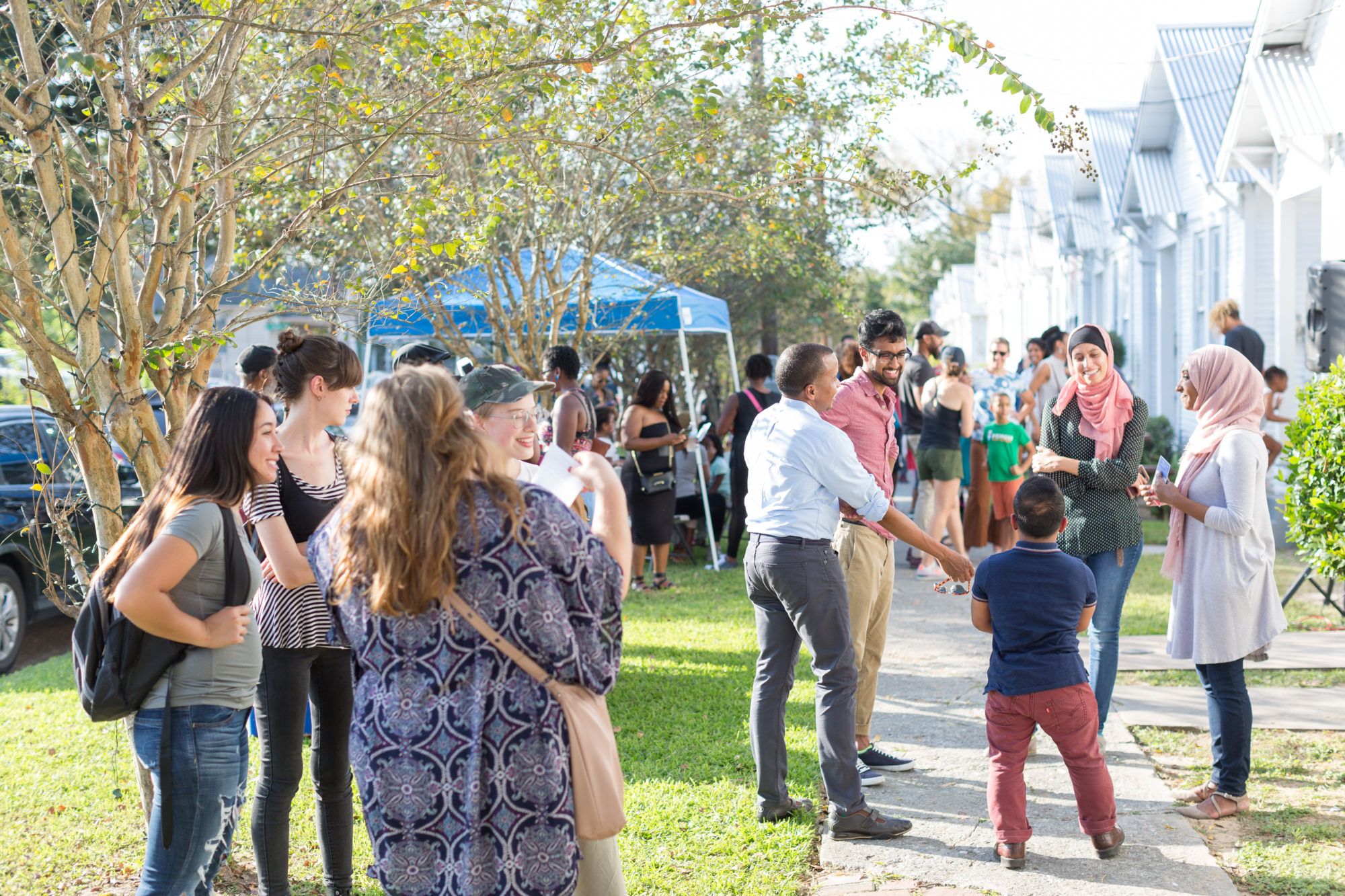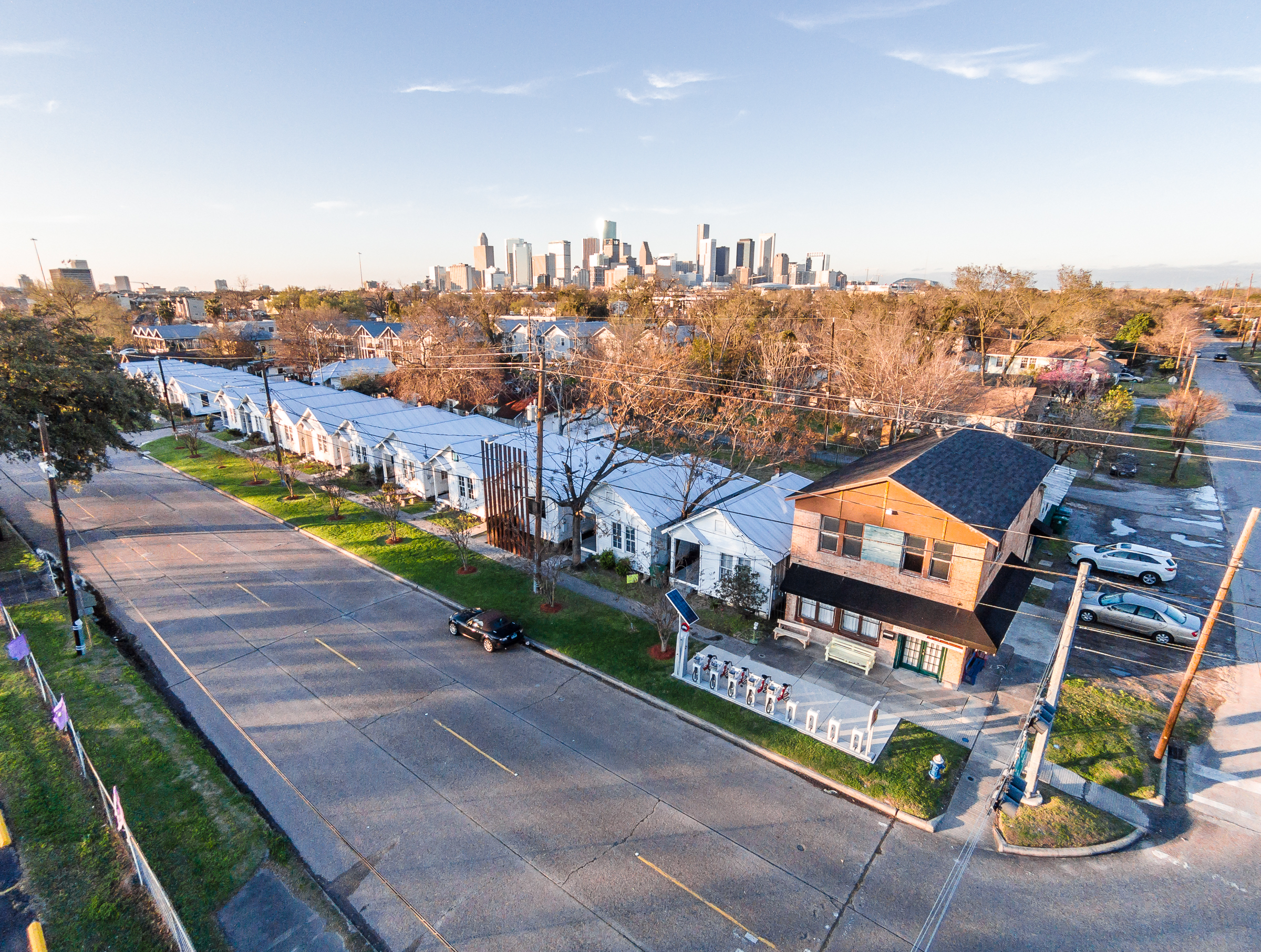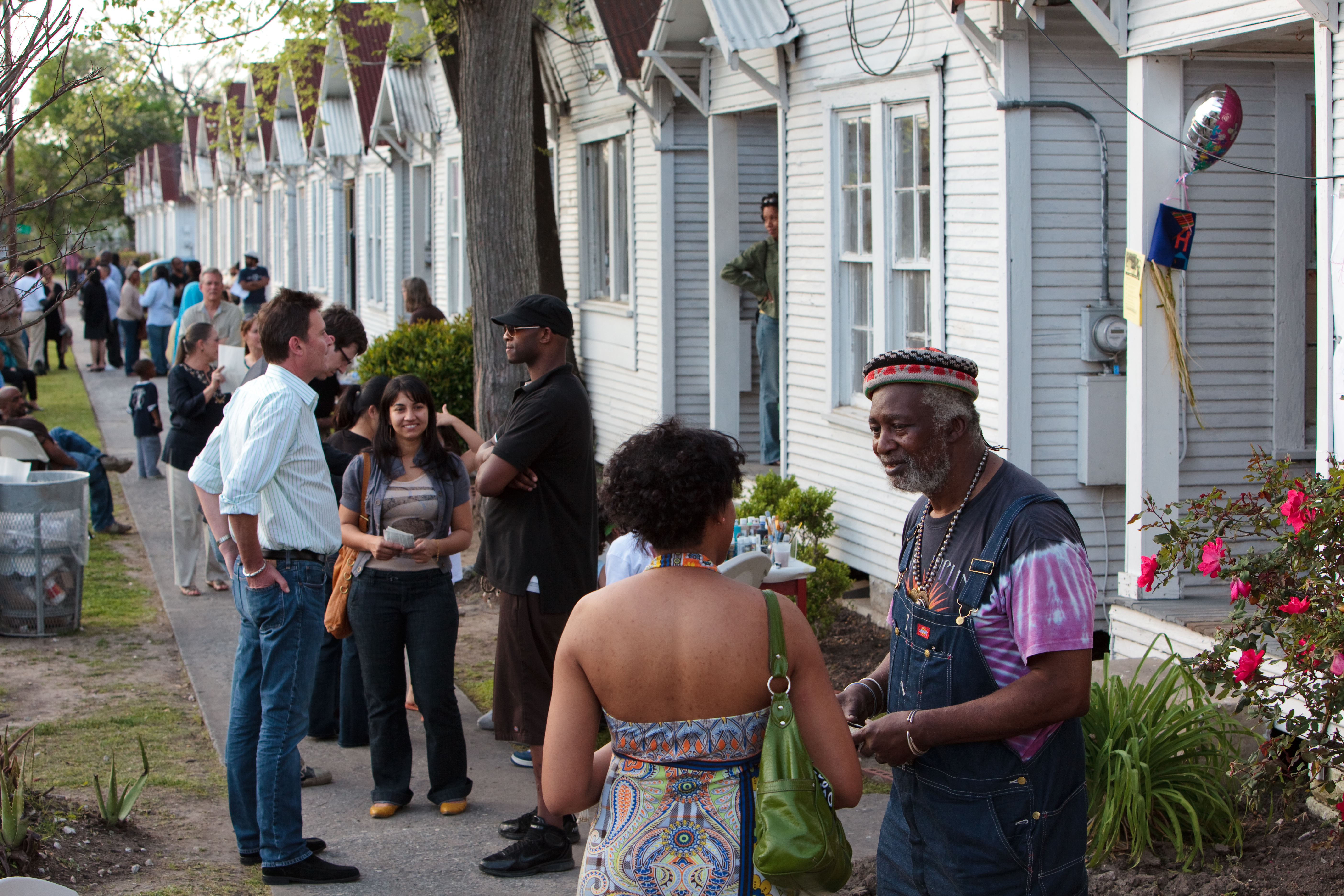
The opening of Round 47, curated by Ryan N. Dennis. Photo: Alex Barber. Courtesy of Project Row Houses.
Founded in 1993 by African-American artists and activists who wanted to enact a positive, creative presence in their community, Project Row Houses (PRH) is an arts nonprofit in Houston’s Third Ward. The organization provides residencies and funding opportunities for artists alongside social safety-net programming, like its Young Mothers Residential Program, free weekly tutoring, and affordable housing. By responding directly to the needs of the community, PRH serves as a shining example of the ways in which social services and the arts can work hand-in-hand, each enabling and informing the other.
While PRH was spared the worst of the flooding during Hurricane Harvey, the organization did sustain damage to two of its buildings during the storm, and in the aftermath, it cancelled a lunch intended to honor its members. In this interview with PRH’s executive director, Eureka Gilkey, we uncover how the nonprofit’s priorities have shifted in the face of a natural disaster while remaining faithful to its mission: “transforming the community through the celebration of art and African-American history and culture.”

Aerial view of Project Row Houses during Round 41, curated by Ryan N Dennis. Photo: Peter Molick. Courtesy of Project Row Houses.
Lindsey Davis: How do you balance PRH’s arts initiatives with the social services it provides? Is there a magic formula for providing both?
Eureka Gilkey: For the most part, Project Row Houses doesn’t directly provide social services. We are focused on long-term, sustainable development for both individuals and ideas. The closest program to direct services would be our Young Mothers Residential Program (YMRP), which empowers low-income single mothers and their children to achieve self-sufficient lives while fostering a sense of interdependence: the idea that you can lean on others in the community and be there for them to lean on, too. Many people confuse us for a social-service organization because our work has a similar effect, of neighborhood transformation, but we consider such effects to come through the process of developing a social sculpture. A more successful, equipped neighborhood is the sculpture we are building together, and that requires access to resources as well as creative thinking and drawing new patterns.
Our programs are different from a lot of social services due to their longevity and their transformative effect on the neighborhood and participants. PRH’s continued relevance in the community points to our impact. Our focus isn’t on numbers as much as on cultivating independent agents of change in the neighborhood through opportunities that help them attain sustainability.
LD: What steps do you take to ensure that your programs and initiatives are aligned with the needs of the community?
EG: We share a neighborhood with Third Ward residents, and that includes its culture and its challenges. Our programs and the community’s needs align because we maintain an organizational culture of being good neighbors. We can’t know the needs of the residents if we don’t know the residents. Many of our programs are developed in response to the neighborhood’s requests and needs, and if we can’t provide something, we do our best to connect residents to resources or existing programs that can meet those needs.

Writing in the Margins workshop by Ayanna Jolivet Mccloud during Round 42, curated by Ryan N Dennis. Photo: Michael McFadden. Courtesy of Project Row Houses.
LD: Which Project Row Houses program has had the greatest impact on the community?
EG: Our programs address a wide range of challenges that the community has faced over the past twenty-four years, and they’ve all been impactful in different ways. We developed a sustainable, affordable-housing program that grew into our sister organization—Row House Community Development Corporation, established in 2003—that has since expanded to provide homes for fifty-six families within the Third Ward. Over the years, we’ve operated an education program that has seen countless youths pass through our after-school classes and our summer camp.
At the individual level, YMRP has changed lives and provided better education and professional opportunities for participating families. Through the program, women and their children were able to develop a support system that allowed them to pursue their dreams. Children from the early days of the program, who had the opportunity to grow up in a creative community, are now in college!
Similarly, our Incubation Program has given others the chance to make their dreams a reality. The Third Ward has long been considered a food desert, but it now has NuWaters Food Co-Op, a place within walking distance to get fresh, organic produce. Third Ward Bike Shop has grown into Workshop Houston, an amazing organization that still operates in the community as an agency for youth development and continues to be a neighborhood resource. Small businesses like Crumbville TX Storefront and All Real Radio illustrate that there is a desire to have family-centric amenities in the community.
The Public Art Program, which includes residencies and opportunities to exhibit work, has given artists a chance to blend their artistic practices into the social context of our community. They often take the lessons we’ve learned as an organization and disseminate them across the country.
LD: How did Hurricane Harvey alter the priorities and actions taken by PRH?
EG: When we saw the aftermath of the storm, it wasn’t a difficult decision to cancel the “Celebration at Emancipation” event. Our community wasn’t affected to the extent that others were, and we didn’t want to distract people from recovery efforts across the city.
We’re addressing some damage to a couple of our buildings and taking the repairs as an opportunity to reevaluate how we use our spaces to interact with the community. Overall, our priorities haven’t changed. We remain dedicated to supporting individuals and ideas so that they can go on to do the same for others.

Travelin Man, installation by 2014 Summer Studios resident Charisse Pearlina Weston. Photo: Alex Barber. Courtesy of Project Row Houses.
LD: How do you feel arts nonprofits should respond, in the wake of a natural disaster? What obligations do they have to their communities, even if they’re not involved in providing social services?
EG: How an organization responds to a disaster of the level of Harvey really depends on its capacity. If one has taken on damage, one needs to address it, but if one is able to help in some way, one should. Our offices were closed for a while, but we put together a list of resources on our website so that the community had easier access to aid. Other organizations in Houston responded in different ways. For example, TX/RX Labs hosted workshops to teach people how to make repairs to their homes, and a lot of small organizations and businesses hosted events to raise recovery funds.
LD: What are some misconceptions about the work done by PRH?
EG: Because there are a lot of access points to PRH, people don’t always understand the breadth of the work we do until they see it for themselves. Through art, we help people to see themselves and others differently. There’s poetry in the everyday life of a community that often goes unnoticed, and I hope people start to recognize it after they visit us.




